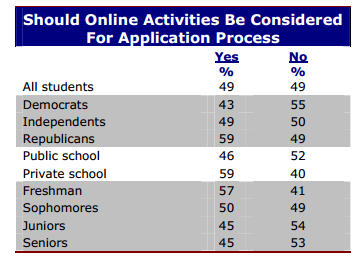In a recent survey of American college students, 74% said that if a potential employer or graduate school received their online activity, it would “make no difference either way when it came to their chances of being hired or accepted.” 17% said it might actualy help their chances while only 8% said it might hurt them.
Still, nearly half the students (49%) worry about how much information is available about them online. Women (55%) are more concerned about this issue than men (41%).
These findings are from the 2012 Survey of America’s College Students, conducted on behalf of the Panetta Institute by Hart Research Associates. The telephone and online survey of 806 students has a margin of error of plus or minus 3.5%.
Should employers and grad schools consider social networking activities?
Students are equally divided on whether online activities should be considered for application reviews, but the closer they are to graduation, the more they think that their activities should not be considered (53% of seniors said “no” vs. 41% of freshmen). As the chart below indicates, there are also some interesting differences based on party affiliation and type of school with Democrats and students at public schools more likley to say that online activities should not be considered.
It has been reported that some employers and schools look at public postings on Facebook and other social networks when considering applications. On Facebook, private postings would not be accessible unless someone you authorized to see that information turned it over to the school or employer.

Internet as news source
Students are big users of social networking with 69% saying that they’re a major source for keeping up with friends and family. Nearly six in 10 (59%) said they turn to the Internet for news and information about politics and civic affairs compared to only 29% in the 2001 survey. Only 38% of students report TV as a primary news source.
Social and political views
These questions were part of a much broader survey that looked at political and economic views, satisfaction with the country’s political leadership and attitudes towards social issues such as abortion and same sex marriage.
Disclosures: On Monday, May 28th, I will speak as part of the Panetta Institute’s 2012 lecture series along with Arianna Huffington, Vinton Cerf and moderator Frank Sesno. Also, I am co-director of ConnectSafely.org, a non-profit Internet safety organization that receives support from Facebook.
Be the first to comment